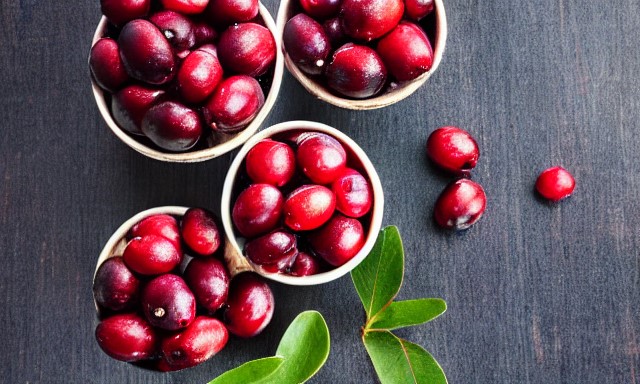Internet Asks: "Are Cranberries Acidic?"
Cranberries, with a pH range of 2.3 to 2.5, are considered acidic. Their tart flavor is due to the presence of organic acids like citric, malic, and quinic acids. While cranberries offer numerous health benefits, their acidic nature can potentially cause discomfort for some individuals, especially those with acid reflux or other gastrointestinal issues. Before making any significant dietary changes, it's essential to consult with a healthcare professional.
Health Benefits of Cranberries
-
Rich in antioxidants: Cranberries are packed with antioxidants, such as polyphenols and vitamin C, which help protect the body against cellular damage caused by free radicals. Antioxidants may reduce the risk of developing chronic diseases, including heart disease and cancer.
-
Urinary tract health: Cranberries contain compounds called proanthocyanidins, which can help prevent urinary tract infections (UTIs) by preventing bacteria from adhering to the walls of the urinary tract.
-
Heart health: Studies suggest that cranberries can help improve heart health by reducing LDL cholesterol levels and increasing HDL cholesterol levels. The polyphenols in cranberries may also contribute to improving blood vessel function and reducing blood pressure.
-
Anti-inflammatory properties: The phytochemicals in cranberries have been shown to possess anti-inflammatory properties, which may help reduce inflammation in the body and lower the risk of developing chronic inflammatory diseases.
-
Skin health: The antioxidants, particularly vitamin C, found in cranberries can help protect the skin from damage caused by free radicals and environmental factors. Vitamin C is also crucial for collagen production, which helps maintain the skin's elasticity and youthful appearance.
-
Dental health: The proanthocyanidins in cranberries can help inhibit the growth of harmful bacteria in the mouth, reducing the risk of cavities and gum disease. The anti-adhesion properties of cranberries also help prevent plaque formation, promoting overall dental health.
-
Immune system support: Cranberries are rich in vitamin C, which is essential for a healthy immune system. Vitamin C supports the production of white blood cells, which play a crucial role in defending the body against infections and diseases.
-
Digestive health: Cranberries contain dietary fiber, which supports healthy digestion by adding bulk to the stool and promoting regular bowel movements. Fiber can also help lower cholesterol levels and maintain stable blood sugar levels.

Cranberries and Acid Reflux
For individuals with acid reflux, also known as gastroesophageal reflux disease (GERD), consuming acidic foods like cranberries may exacerbate symptoms. Acid reflux occurs when stomach acid flows back into the esophagus, causing irritation and discomfort. Common symptoms of acid reflux include heartburn, regurgitation, and a sour taste in the mouth.
Cranberries, being acidic, can potentially trigger or worsen acid reflux symptoms for some individuals. However, this varies from person to person, as some people may be more sensitive to acidic foods than others. If you experience acid reflux, it may be beneficial to monitor your symptoms and consume cranberries in moderation to determine whether they have any adverse effects. If cranberries do exacerbate your acid reflux symptoms, consider opting for lower-acid fruits, like bananas or melons, as alternatives.
Incorporating cranberries into a balanced diet with a variety of fruits, vegetables, whole grains, and lean proteins can also help minimize their impact on acid reflux. Additionally, adopting lifestyle changes, such as eating smaller meals, avoiding lying down soon after eating, and maintaining a healthy weight, can help manage acid reflux symptoms more effectively.
It's important to consult with a healthcare professional if you have acid reflux or other gastrointestinal concerns to receive personalized advice and guidance on managing your symptoms through dietary and lifestyle adjustments.
How to Reduce Acidity While Eating Cranberries
-
Combine with alkaline foods: Pairing cranberries with alkaline foods, such as leafy greens or root vegetables, can help neutralize some of the acidity.
-
Choose less acidic forms: Opt for dried cranberries or cranberry sauce, which tend to be less acidic than fresh cranberries.
-
Incorporate into recipes: Adding cranberries to recipes, like salads, baked goods, or smoothies, can help dilute their acidity and make them more tolerable for sensitive stomachs.
Conclusion
While cranberries are indeed acidic, they offer numerous health benefits, such as being rich in antioxidants, promoting urinary tract health, supporting heart health, and possessing anti-inflammatory properties. However, for individuals with acid reflux or other gastrointestinal issues, it's essential to consume cranberries in moderation or opt for lower-acid fruits. To reduce acidity while eating cranberries, consider combining them with alkaline foods, choosing less acidic forms, or incorporating them into various recipes. Always consult with a healthcare professional before making significant dietary changes, especially if you have acid reflux or other gastrointestinal concerns.
References
- U.S. Food and Drug Administration: Approximate pH of Foods and Food Products. (2007). https://www.healthycanning.com/wp-content/uploads/pH-FDAapproximatepHoffoodslacf-phs.pdf
- Basu, A., Betts, N. M., Ortiz, J., Simmons, B., Wu, M., & Lyons, T. J. (2011). Low-energy cranberry juice decreases lipid oxidation and increases plasma antioxidant capacity in women with metabolic syndrome. Nutrition Research, 31(3), 190-196. https://doi.org/10.1016/j.nutres.2011.02.003
- Medicla News Today. What to know about cranberries. https://www.medicalnewstoday.com/articles/269142
- Tastylicious. Are Cranberries Acidic?. https://tastylicious.com/are-cranberries-acidic/
- Carr, A. C., & Maggini, S. (2017). Vitamin C and immune function. Nutrients, 9(11), 1211. https://doi.org/10.3390/nu9111211
- Slavin, J. (2013). Fiber and prebiotics: mechanisms and health benefits. Nutrients, 5(4), 1417-1435. https://doi.org/10.3390/nu5041417
- Pullar, J. M., Carr, A. C., & Vissers, M. C. M. (2017). The roles of vitamin C in skin health. Nutrients, 9(8), 866. https://doi.org/10.3390/nu9080866
People are also reading...
🍉 Is Watermelon Acidic?
🫐 Are Blueberries Acidic?
🥭 Are Mangoes Acidic?
Ready to level-up?
Create meal plans 10x faster, follow up with your clients through our mobile app, and never struggle with meal planning or recipe management again.